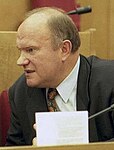
Back الانتخابات الرئاسية الروسية 1996 Arabic Президентски избори в Русия (1996) Bulgarian Eleccions presidencials russes de 1996 Catalan Prezidentské volby v Rusku 1996 Czech Präsidentschaftswahl in Russland 1996 German Ρωσικές προεδρικές εκλογές του 1996 Greek Elecciones presidenciales de Rusia de 1996 Spanish Venäjän presidentinvaali 1996 Finnish Élection présidentielle russe de 1996 French הבחירות לנשיאות רוסיה 1996 HE
You can help expand this article with text translated from the corresponding article in Russian. (February 2022) Click [show] for important translation instructions.
|
| |||||||||||||||||
| Opinion polls | |||||||||||||||||
| Registered | 108,589,050 (second round) | ||||||||||||||||
|---|---|---|---|---|---|---|---|---|---|---|---|---|---|---|---|---|---|
| Turnout | 68.78% ( | ||||||||||||||||
| |||||||||||||||||
 Second round results by federal subject Yeltsin: 45–50% 50–55% 55–60% 60–65% 65–70% 70–75% 75–80% Zyuganov: 45–50% 50–55% 55–60% 60–65% | |||||||||||||||||
| |||||||||||||||||
Presidential elections were held in Russia on 16 June 1996, with a second round being held on 3 July 1996. It resulted in a victory for the incumbent Russian president Boris Yeltsin, who ran as an independent politician. Yeltsin defeated the Communist Party of the Russian Federation challenger Gennady Zyuganov in the second round, receiving 54.4% of the vote. Yeltsin's second inauguration ceremony took place on 9 August 1996.
Yeltsin would not complete the second term for which he was elected, as he resigned on 31 December 1999, eight months before the scheduled end of his term on 9 August 2000; he was succeeded by his chosen successor, Vladimir Putin, whom he had appointed prime minister of Russia a few months earlier. This was the first presidential election to take place in post-Soviet Russia. As of 2024, this has also been the only Russian presidential election in which no candidate was able to win on the first round, and as such a runoff election was necessary.
Although most contemporaneous reports certified the 1996 election result, the election has been associated with various counts of pro-Yeltsin media bias and foreign influence, as well as allegations of electoral fraud or that it was an unfair election. Critics also argued that Yeltsin had engaged in vote buying by utilizing state finances to fund social programs, to which he responded he was merely doing his duties as president. Others argued that the allegations were exaggerated, and that the then United States government in fact refrained from covert operations and did not grant all of Yeltsin's requests.

